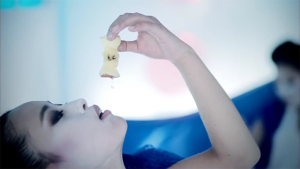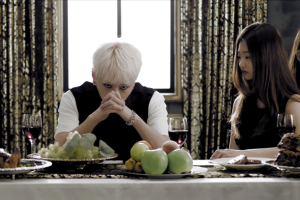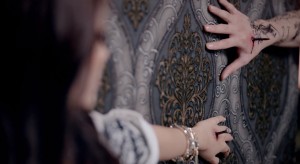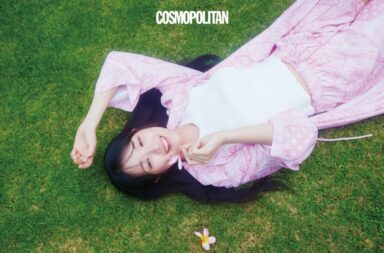 It’s not hard to guess the inspiration behind Ga-in‘s eighth and latest solo album — the album’s name itself, Hawwah, translates directly from Hebrew as ‘Eve’. The six tracks on the album cast Ga-in as Eve to retell her story of sin and eventual banishment from Eden, and the music video for “Paradise Lost” keeps to concept. Right from the video’s start, a green serpent slides across the screen as the background blackens with neon phrases affirming Eve’s guilt.
It’s not hard to guess the inspiration behind Ga-in‘s eighth and latest solo album — the album’s name itself, Hawwah, translates directly from Hebrew as ‘Eve’. The six tracks on the album cast Ga-in as Eve to retell her story of sin and eventual banishment from Eden, and the music video for “Paradise Lost” keeps to concept. Right from the video’s start, a green serpent slides across the screen as the background blackens with neon phrases affirming Eve’s guilt.
As a concept album, Hawwah and accompanying single “Paradise Lost” explore and even celebrate the character of Eve. But Hawwah as a whole is an unusual product, as few K-pop albums can commit to such a controversial theme or interpret so literally the subject matter as Ga-in dares to. Biblical references in music videos exist, but of these videos few are actually about faith. Instead, many music videos contain biblical references as a way of using scripture to enhance the storyline of a song.
“Apple,” the second music video to be released by Ga-in, is an example. The fall of Adam and Eve is not the true focus of the song, but rather a metaphor for the sexual temptation between a modern couple. Ga-in toys with a red yoga ball which serves as obvious apple imagery. But clothed in a red leotard — and with extra emphasis on her backside — Ga-in takes on the form of forbidden fruit herself. With the song’s repetition of “don’t, don’t, don’t, don’t, don’t,” and “do, do, do, do, do,” there’s a teasing tone to the music that is mirrored in the video. Ga-in’s portrayal of both temptress and the temptation are meant to be too much for her unsuspecting lover; she’s sexually irresistible and she knows it.
 However, Ga-in was far from the first to use forbidden fruit as a symbol of temptation. G-Dragon‘s “Heartbreaker” featured red apples extensively as a representation of the human heart. The subject of the song is fairly self-explanatory, given the song’s title. The lyrics speak of being blindsided by a break-up, and struggling with residual feelings of confusion and betrayal towards the ex-lover. And so the apples of “Heartbreaker” are chewed down to the core, as G-Dragon has already succumbed to temptation and is paying the price as an Adam after Eden.
However, Ga-in was far from the first to use forbidden fruit as a symbol of temptation. G-Dragon‘s “Heartbreaker” featured red apples extensively as a representation of the human heart. The subject of the song is fairly self-explanatory, given the song’s title. The lyrics speak of being blindsided by a break-up, and struggling with residual feelings of confusion and betrayal towards the ex-lover. And so the apples of “Heartbreaker” are chewed down to the core, as G-Dragon has already succumbed to temptation and is paying the price as an Adam after Eden.
What differs in these two uses of forbidden fruit is the treatment of Eve. From a female portrayal, Ga-in’s Eve is aware of the repercussions of giving into temptation, but disregards the danger. Jay Park‘s featuring verse in “Apple” aligns with this attitude by describing a man who is weak to temptation and willing to indulge himself:
Yeah girl, yeah, I want it too
I can’t deny it any longer
It’s hard but I keep pretending I don’t
But now it’s almost impossible
On the other hand, the male perspective of “Heartbreaker” takes a harsher stance towards Eve and her antics. G-Dragon paints himself as a victim with lyrics that are tinged with spite towards the female subject of the song. There is no sign of self-blame anywhere in the song — the line “What did I do wrong?” is indicative of the man’s belief in his own innocence, whether or not this is the actual case.
Forbidden fruit is not the only religious reference found in music videos; just as popular is the story of the Last Supper. Often, scenes mirror the staging of Leonardo DaVinci’s iconic “Last Supper” painting to suggest an impending betrayal of some sort. Already proven to be no stranger to highly symbolic music videos, G-Dragon staged a Last Supper styled scene in his music video “Coup d’Etat.” Slouched against the head of a long table, GD is flanked on both sides by blindfolded journalists who thrust recorders and flashbulbs in his face.
 “Coup d’Etat” signifies G-Dragon breaking free from what previously burdened him and held him hostage in his old life, including high expectations from fans, heartbreak and mistakes made in his youth. The Last Supper setting speaks of another: the media which chooses not to present G-Dragon for who he really is, betraying him and handing him over on a platter to the public for judgement.
“Coup d’Etat” signifies G-Dragon breaking free from what previously burdened him and held him hostage in his old life, including high expectations from fans, heartbreak and mistakes made in his youth. The Last Supper setting speaks of another: the media which chooses not to present G-Dragon for who he really is, betraying him and handing him over on a platter to the public for judgement.
BEAST‘s “Good Luck” spins the Last Supper in a more literal interpretation. Junhyung is found seated at the center of a long table as beautiful women mingle around his brooding figure in groups of three, the classical arrangement of apostles from DaVinci’s “The Last Supper.” As the song crescendos, money exchanges hands and the female love interest shows her true colors by spearing Junhyung with a dinner knife.
 Noticeably, it’s the motivation behind the betrayal that’s emphasized — as Junhyung slumps down in his chair, gold coins spill like blood unto the floor. Lyrically, “Good Luck” addresses a former lover. While BEAST speak of wishing her well, their blessings are tainted with bitterness and unresolved feelings. The payment of gold coins places the former lover squarely in Judas’s story, suggesting that she used her partner for money or personal gain before leaving him altogether.
Noticeably, it’s the motivation behind the betrayal that’s emphasized — as Junhyung slumps down in his chair, gold coins spill like blood unto the floor. Lyrically, “Good Luck” addresses a former lover. While BEAST speak of wishing her well, their blessings are tainted with bitterness and unresolved feelings. The payment of gold coins places the former lover squarely in Judas’s story, suggesting that she used her partner for money or personal gain before leaving him altogether.
And betrayal leads to the most definitive Bible story of them all, the crucifixion of Christ. Ji-eun‘s “False Hope” music video hints at the story during the start of the song, as Ji-eun lies in a cage of thorns and displays a puncture wound in the center of her palm. However, the video doesn’t entertain any subtleties about the allusion, eventually showing Ji-eun and her lover with bloody palms nailed together and later nailed separately against the same wall. “False Hope” is rather self-explanatory as a song; the singer is berating a lover who led her on as she tries to destroy her lingering feelings towards him.
 From the start, the lover is depicted as a harmful presence, from his on-screen smirk to the thorny vines of tattooed roses running up his arms. In the biblical story of crucifixion, Jesus‘s death on the cross is shown as a sacrifice for sinners. “False Hope” shows a similar intention of sacrifice in the context of romantic love. With her palm nailed to his in a grotesque hand-hold, Ji-eun crucifies herself to a one-sided love and a man who toys with her affections. The nail represents her false hope, and not even the steel pin can ensure closeness in the end. Ji-eun and her lover eventually find their hands hammered to separate sections of a wall using the same nail, now only suffering needlessly and without any pretense of intimacy.
From the start, the lover is depicted as a harmful presence, from his on-screen smirk to the thorny vines of tattooed roses running up his arms. In the biblical story of crucifixion, Jesus‘s death on the cross is shown as a sacrifice for sinners. “False Hope” shows a similar intention of sacrifice in the context of romantic love. With her palm nailed to his in a grotesque hand-hold, Ji-eun crucifies herself to a one-sided love and a man who toys with her affections. The nail represents her false hope, and not even the steel pin can ensure closeness in the end. Ji-eun and her lover eventually find their hands hammered to separate sections of a wall using the same nail, now only suffering needlessly and without any pretense of intimacy.
Other religious motifs exist in K-pop music videos, though not all are explicitly biblical. The seven deadly sins are another frequently referenced concept, found in in 2PM’s “Come Back When You Hear This Song” and Epik High’s “Born Hater.” And most recently, Exo’s “Pathcode” teasers have alluded to the story of the Exodus and the seven plagues in several members’ videos. And to be sure, religious references in the realm of K-pop are certainly not limited to stories of the Bible, but with a third of South Korea’s population reporting some form of Christianity as their chosen religion, transporting and transforming scripture to modern day media is one way to tell a story and make it stick.
What do you think, readers? Do religious references enhance or damage the message of a music video? Have any symbols or references caught your own eye?
(CIA World Factbook, Images via LOEN Entertainment, YG Entertainment, Wikipedia, Cube Entertainment, TS Entertainment)

